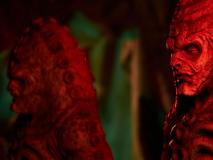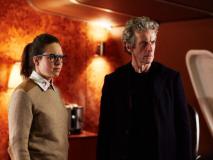More media coverage from this evening of the US premiere of the series today:
Zap2It, in an article being printed Sunday in the Los Angeles Times, notes that "Once upon a time, there was a BBC science-fiction series called "Doctor Who" whose special effects were of the bubble-gum-and-rubber-band variety and whose basic premise sounded as cheesy as the show looked: A wanderer from the distant future fights intergalactic evildoers while traveling through space and time in a machine that is camouflaged as a London police box. Uh, right. Yet somewhere along the line, 'Doctor Who' became the longest-running sci-fi series in TV history (26 years), spawned several movie spinoffs, a mini-publishing empire, audiotapes, memorabilia, conventions, you name it. Now, after being off the air for 17 years, a new 'Doctor Who' series, first seen on the BBC last year, comes to the Sci Fi Channel on Friday (March 17). And therein lies a tale. When 'Doctor Who' first appeared on the BBC in 1963, it was a show for older children that aired late on Saturday afternoons. But quicker than you can say 'Daleks' -- the race of robots who became the title character's chief nemeses -- the program became a national sensation. The reasons were soon evident. The doctor's ability to go backward and forward in time meant that story lines were highly flexible. Although obviously a kids' program, 'Doctor Who' also had a wink-wink sense of humor that appealed to adults. Then there were the seven actors who played the doctor, who tended toward the warmly avuncular. And because Doctor Who takes on traveling companions from the places he visits who then join him on his adventures, the show could bounce its protagonist off against an ever-changing roster of foils. Plus, 'Doctor Who's' cheesy look actually worked in its favor. 'It was shameless about its shortcomings,' says Russell T. Davies, executive producer and head writer of the new series. 'They did intergalactic wars and invasions of the Earth with $2. Somewhere, by accident, they captured something very true about the world, that the future is very clumsy and nailed together. There is something beautifully normal about the 'Doctor Who' universe.' Los Angeles resident Shaun Lyon, who wrote 'Back to the Vortex,' a book about the new series, and whose Outpost Gallifrey (gallifreyone.com) is the premier 'Doctor Who' website in this country, echoes this 'It's the story line, stupid' sentiment by noting that America's most popular science-fiction program also had similarly cheesy production values. 'If you look back at the original 'Star Trek,' you'll see the same thing -- bad special effects,' Lyon says. 'The appeal is in the storytelling, even if there are no $10 million visual effects budgets. It's the stories, the characters, the actors themselves.' Although the series has been seen on PBS over the years, 'Doctor Who' never really developed a massive fan base in this country. Competition from shows like 'Star Trek' certainly held it back, and its chintzy foreign flavor didn't always translate well. But it did acquire a rabid cult following that now sponsors several 'Who'-oriented conventions (last month's L.A.-based Gallifrey One conclave was the 17th annual). But as with 'Star Trek,' 'Doctor Who's' 1989 demise did not end the appetite for it. So when veteran British TV writer Davies ('Queer as Folk') pitched the BBC a new version of the venerable doctor, the network went for it. 'I knew it could work again,' says Davies, 'that there was a new generation that could enjoy it. But I wasn't certain what the BBC wanted, whether they wanted an ironic version late at night. What they wanted was 7 o'clock prime time on a Saturday, which was how I wanted to bring it back. There hadn't been a sci-fi show on prime time in Britain for over 20 years, since 'V.' ' Davies understood that the fan community would want to have a say in the series' new direction, but he completely ignored the sci-fi message boards, claiming, 'It's the most stupid thing you can do, and people are seduced into believing that the most creative thing you can do is engage with your online fandom.' He also instinctively realized that the 21st century version of the doctor would have to be hipper, smarter and sexier than any previous incarnation. 'I decided to write it like anything else I'd write,' he says. 'I write character, I write funny, I write dramatic, and there's no way science fiction can't be the same thing. You just have to not steep it in nostalgia and not write techno-babble either.' Gussied up with state-of-the-art special effects and the kind of self-referential story lines that both kids and adults appreciate, the new 'Doctor Who' debuted on the BBC in March 2005 and proved an immediate smash hit (the series is in production on its second season). When he was developing the show, says Davies, 'I was thinking of 'Toy Story.' We were specifically aimed at getting a family audience, which people said didn't exist anymore. It was simply following the pattern of the old 'Doctor Who,' which was quietly witty while appealing to kids at the same time. The Pixar art of aiming at adults and kids is really difficult, but that's the path I tried to follow.'"
About.com: "After being a smash on English TV, the latest incarnation of Dr. Who comes to America on SCI FI Channel tonight at 9 PM ET. For those who don't know, Dr. Who (so named because his real name is just too weird for us puny humans to pronounce) is a Time Lord, traveling around time and space with a human companion at his side. Rose works in a shop and is bored out of her mind when along comes a Time Lord with his promises of great adventure (after working with Rose to save the Earth). He delivers. This time around, The Doctor is being played by Christopher Eccleston, who brings a TARDIS-load of energy and humor to the role. Billie Piper brings, thank goodness, a lot more than 'spunk' to Rose. She's fun and funny in her own right."
The
North Adams Transcript: "The two-hour American premiere of the revived "Doctor Who" (Friday, March 17, at 9 p.m. on the Science Fiction Channel) may be first honest opportunity this long-running British series has really had to appeal to Americans -- that is, beyond the usual oddball cultists. In its current incarnation, the show is accessible and fun, with just enough darkness to add to the tension and intrigue. ... As helmed by the versatile Russell P. Davies, creator of "Queer As Folk," this 2005 version has the Doctor appearing out of nowhere in a department store basement in order to save Earth from a bunch of killer mannequins. ... The series captures, with a great degree of sincerity, the same rollicking male/female adventure dynamic that films like "Austin Powers" lampoon -- if the Doctor and Rose aren't the John Steed and Emma Peel of our time, then I don't know who are -- and it's this dynamic that makes the series shine. The Doctor, a displaced alien whose only remaining calling in life is to show off his knowledge of the universe, and Rose, a bored teenager desperately looking for a better way to live, not only need each other, but love each other's company. It's an infectious relationship that rarely succumbs to the typical romantic television cliches. This is a tale of equals with different strengths. Davies has transformed the old children's show into a fairly sophisticated drama that manages to hold different levels of interest for all ages. The show is also high on satire and, throughout its 13-episode run, examines political and social issues -- nationalism, isolationism, consumer culture, war, class, sexuality, and justice -- with great humor. There are also echoes of 9/11, the war in Iraq, and the corporate-controlled media, as well as natural human complacency in regard to the big picture. 'Doctor Who' is clearly one of the smartest TV shows around, but it doesn't decrease its enjoyment level through heavy-handedness. There are still plenty of aliens and monsters and space ships -- and, in the Doctor, we oddballs still have a hero we can believe in."
The
Kansas City Star: "The British cult classic sci-fi series that periodically used a new actor to play the good doctor begins a 13-episode run with Christopher Eccleston as the traveling time lord in some 2005 episodes. The previous Dr. Who, of course, was the guy who played Screech on “Saved by the Bell.” (Well, we might be misremembering that particular piece of trivia, but with Daleks menacing everybody, what’s the difference?)"
SyFy Portal says that "New 'Doctor Who' Is Not So Niche-y" in an article that features interview clips from various Russell T Davies comments over the past year.
North Jersey Media Group notes that "Christopher Eccleston becomes one of the many actors to play the droll time traveler on the small screen in this remake of the long-running sci-fi series. Eccleston's Doctor finds his ideal traveling companion in shopgirl Rose Tyler (pop star-turned-actress Billie Piper)."
Now Playing magazine is reprinting reviews by Arnold Blumberg from last year in conjunction with the broadcast of the show.
Doctor Who is one of the three Daily Picks on the
TiVo video recording network.
(Thanks to Paul Engelberg, John Mitchell, Scott Alan Woodard and Lewis Beale)






















